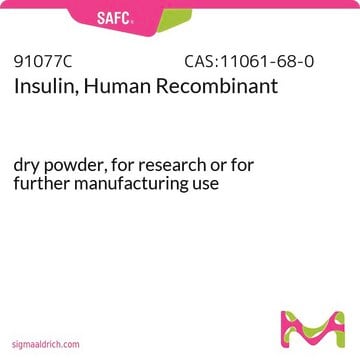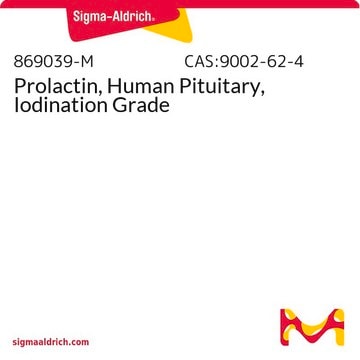L4021
Prolactin human
recombinant, expressed in E. coli, lyophilized powder, BioReagent, suitable for cell culture, >97% (SDS-PAGE)
Synonym(s):
hPRL, LTH, Lactogenic Hormone, Luteotropic Hormone, PRL
About This Item
Recommended Products
recombinant
expressed in E. coli
Quality Level
description
200 amino acid residue methionyl form of mature, recombinant human prolactin (amino acid residues 29-227).
product line
BioReagent
Assay
>97% (SDS-PAGE)
form
lyophilized powder
potency
0.030-0.300 ng/mL EC50
mol wt
predicted mol wt ~24 kDa
technique(s)
cell culture | mammalian: suitable
impurities
endotoxin, tested
solubility
water: 0.5000 mL, clear, colorless
UniProt accession no.
shipped in
ambient
storage temp.
−20°C
Gene Information
human ... PRL(5617)
Application
Biochem/physiol Actions
Other Notes
Physical form
Reconstitution
Analysis Note
Signal Word
Danger
Hazard Statements
Precautionary Statements
Hazard Classifications
Repr. 1B
Storage Class Code
6.1C - Combustible acute toxic Cat.3 / toxic compounds or compounds which causing chronic effects
WGK
WGK 3
Flash Point(F)
Not applicable
Flash Point(C)
Not applicable
Certificates of Analysis (COA)
Search for Certificates of Analysis (COA) by entering the products Lot/Batch Number. Lot and Batch Numbers can be found on a product’s label following the words ‘Lot’ or ‘Batch’.
Already Own This Product?
Find documentation for the products that you have recently purchased in the Document Library.
Customers Also Viewed
Our team of scientists has experience in all areas of research including Life Science, Material Science, Chemical Synthesis, Chromatography, Analytical and many others.
Contact Technical Service









